“Okay, Google, how to enter a university without a USE”: stories of students of “School 21”
This year, the first stream of our School of 21 , created by Sberbank following the model of the famous French L'Ecole 42, began training. There are no teachers and no timetable, there is only a stream of projects, deadlines and convenient jobs. Studying at School 21 is free for all, regardless of citizenship. This post is dedicated to the stories of first-stream students, who will tell you how you ventured on this adventure and what it represents from the inside.
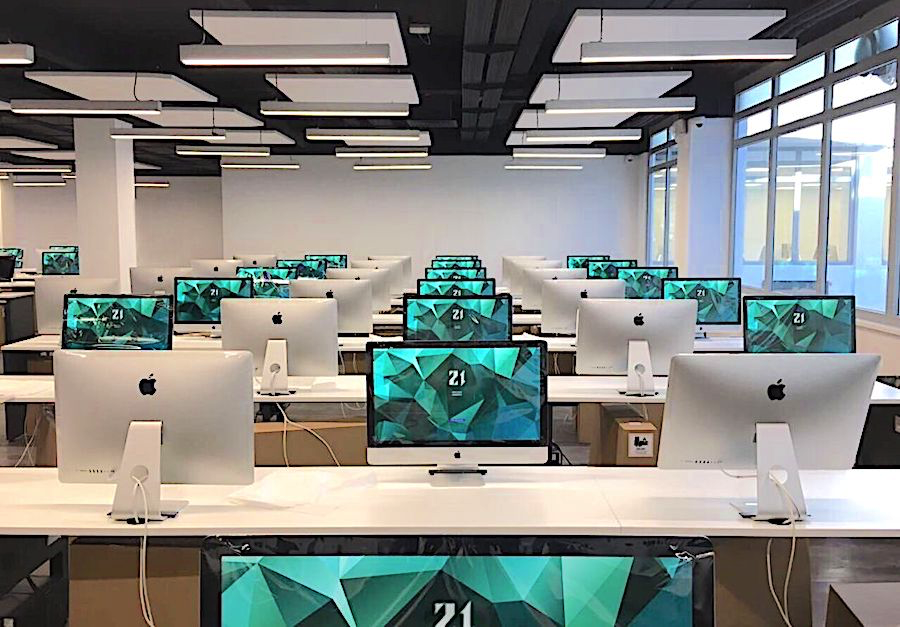
- Hey guys! How did you get into School 21? How did you decide on such a turn?
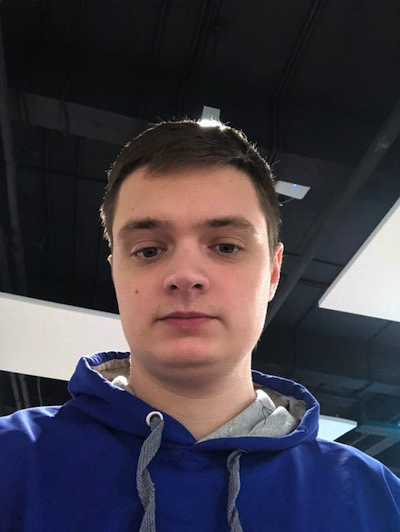 Artyom: Before “School 21” I studied in the first year of a magistracy at a university in St. Petersburg and worked in the concern Aurora, which creates equipment for the military-industrial complex. He worked as an engineer, in accordance with his bachelor's degree - the direction “Management in technical systems”, the profile “Management of ship electric power systems and ship automation”. If not to go deep, then was engaged in equipment adjustment. I chose this specialty, because I had enough points on the exam. Romance is not enough. In general, I wanted to do programming from school.
Artyom: Before “School 21” I studied in the first year of a magistracy at a university in St. Petersburg and worked in the concern Aurora, which creates equipment for the military-industrial complex. He worked as an engineer, in accordance with his bachelor's degree - the direction “Management in technical systems”, the profile “Management of ship electric power systems and ship automation”. If not to go deep, then was engaged in equipment adjustment. I chose this specialty, because I had enough points on the exam. Romance is not enough. In general, I wanted to do programming from school.
')
One summer, the news of “School 21” came from the chat of Sberbank. I ran through it, bookmarked it and forgot. In October, again I stumbled upon this school somewhere, began to dig deeper. He got carried away, passed the first tests, and after a few hours he was invited for a personal interview. He told the girl that we would need to go to Moscow - from the outside it certainly seemed like some kind of incomprehensible adventure. I traveled, underwent a personal interview, received a letter of enrollment in the "pool" (intensive programming course - 4 weeks, 10-14 hours a day, after which you can enroll in a long-term study) .
And here is the turning point. Or now you are changing life and doing in the future what you really like and inspire. Or you stay at the university on a specialty that is not very interesting, and you are doing this further in life. Decided to take a chance. The employer entered the position, let go without any problems and gave leave for the whole time of the “pool”. As for the university, I didn’t bother; I had closed everything up to the maximum and just left. I figured that if with “School 21” does not work, then in a couple of months I will have time to close everything that is left.
Passed the pool, returned to Peter. Was in the third wave of students. Monday was the deadline for the enrollment response. Experienced, even began to do laboratory work for the university. But when the letter of admission came, he closed everything and relaxed.
The next day I arrived at work in the morning and wrote a letter of resignation. It was a little sorry, the team there is very good. But this alone is not enough. Came to the "School", signed a contract. As a result, I had to abandon the university and work, leave from friends and girls.
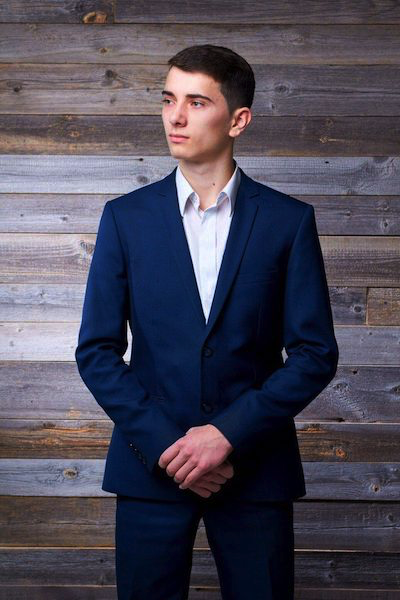 Kirill: I came from Stavropol, it is about 1500 km from Moscow. It all started with the fact that I didn’t pick up points on the EGE, and this brought down my plans for entering the HSE (Higher School of Economics). Summed up an essay on literature. He began to google "how to enter a university without a USE" and found "School 21".
Kirill: I came from Stavropol, it is about 1500 km from Moscow. It all started with the fact that I didn’t pick up points on the EGE, and this brought down my plans for entering the HSE (Higher School of Economics). Summed up an essay on literature. He began to google "how to enter a university without a USE" and found "School 21".
What I read seemed convincing to me, but I also had to convince my parents. How to prove to them that it is better than high school? I told them a lot about the French School 42. They listened and listened and said: “Or maybe you will try after a year?” As a result, I did not immediately persuade my parents, stayed a month at home and did not get into the first stream of School 21. A month later, I was strongly encouraged by the feedback from the first thread, and I persuaded my parents after all. I went to the second wave.
At first, it was terribly hard at the “pool”, I didn’t understand what to do. I met with knowledgeable guys. We did the project a day or two, everything was fine, we all managed to pass. On the third day there was a deadline again, and I did not have time, as it became more difficult. On the fourth, everything happened again, deadlines began to pile up. Freaked out, even started to go home. But then I calmed down and realized that this was my only chance. In addition, after the traditional education, it still looked like a dream - you distribute time yourself, pump skills. Just like in MMORPG.
On three exams in the "pool" received very low points. But they gradually grew - first 15, then 17, then 22 points. With such varying success, I thought that after the "pool" I would have to return to Stavropol. But a month later, as a gift of fate, an invitation came!
Over time, by the way, we became interested in the criteria for admission to School 21. There are many assumptions on this topic, no one knows for sure. They say that there are only 15 criteria. They say that “School 21” is more interested in people without a special background, so that it would not be necessary to retrain people, but this is not accurate, so if you are going to enroll, you shouldn’t hide your real knowledge.
 Nastya: A year ago I graduated from the HSE, Faculty of Oriental Studies, specialization “Japan and Japanese”. After university, I went to work in a large Japanese company in Moscow.
Nastya: A year ago I graduated from the HSE, Faculty of Oriental Studies, specialization “Japan and Japanese”. After university, I went to work in a large Japanese company in Moscow.
I worked there for almost a year. It was incredibly boring. Yes, you communicate with the Japanese, but you have to constantly delve into some kind of investment, logistics, and sales schemes. And in terms of supply of polymethyl methacrylates and pesticides. 20% of the time people actually do something, and 80% write what they did and why. I think this is a common problem for large companies in general and for Japanese ones separately, but something also depends on the industry. Waited for the end of the working day as a holiday, unbearable. It took me half a year, at this moment, despite the good wages and colleagues, I was determined to change something in my life.
I saw the announcement about “School 21” in “Vedomosti” - I needed to read her and other newspapers for work. For a long time it all soared at the level of a cool idea, like many other fateful things in my life. I decided to try. In general, for a long time I considered myself a purely humanist, I have a whole dynasty of humanities in my family. I liked mathematics and computer science at school, but it was taken for granted that I would go to some humanities department. I did not even think of taking the exam on computer science. But at the end of the university I began to wonder: why not try programming? After all, this is the type of work that I love, when there is a specific problem, and you are looking for the most effective solution. You do not sit behind the pieces of paper, do not convince people to buy exactly your product.
Although I did not have background programming knowledge, I was able to pass the first introductory tests without problems. The first was a keepsake, a repetition of combinations of lit squares. When it came to a combination of 64 squares, I had already failed the test. The second test was the selection algorithm * name *, which will bring the cursor from point A to point B. The test was divided into levels, it was necessary to complete a maximum of an hour, and I passed 12 levels. It seemed to me that I did not pass very well, but then I went through, came to a personal interview and got into the “pool”.
Now I am studying and I feel that I lack theoretical knowledge in matane, terver, combinatorics. Still, many guys already have such knowledge. Because of this, I need to work more than the rest in the pool, and on average I spent 14 hours all 14 days in classes. It was a good test for me, my relatives, my husband, who had not seen me all this time - I lived like a hermit.
The “pool” physically exhausted me, but until the last week I did not feel tired. The only thing I regretted is the lack of time. Do not have time to do one task, already give the following. If you do not understand the previous one, you need to catch up, combine. In general, it was difficult, but damn cool.
 Maxim: At school I studied computer science a little, took some related courses on Coursera, talked with friends on these topics. But I did not study closely. I received a humanitarian education as a civil servant, for three years I was still working as a model in Europe and Russia. After high school I went to the army. Interestingly, in the army, even though I had sports training and paperwork skills, basic programming skills turned out to be the most useful.
Maxim: At school I studied computer science a little, took some related courses on Coursera, talked with friends on these topics. But I did not study closely. I received a humanitarian education as a civil servant, for three years I was still working as a model in Europe and Russia. After high school I went to the army. Interestingly, in the army, even though I had sports training and paperwork skills, basic programming skills turned out to be the most useful.
After the army, I wondered what to do next. The career of the model was no longer attractive - probably not the age, and indeed not my field. There was some experience with the civil service - I managed to understand that it was boring, uninteresting and useless. But programming was interesting - it is a creation, it is on the hype. Began to look for options, found a technical magistracy, several interesting courses. But this did not justify the expectations, did not feel the necessary returns.
At this point, a friend sent information about "School 21". Passed the first tests for memory, algorithms, then invited to a meeting and the "pool". Only there I understood what I signed up for, but it was great. I will not say that I donated something - I purposefully walked towards changing something in my life.
- The most vivid impressions of the "School"? What is the most difficult thing to learn?
Artem: I like the way the training is built here. Complete freedom of action, I can come and go when I want - in classical education this is not enough. I can practice from morning till night, at night. I can not appear for weeks, but it will affect the performance.
The most difficult thing in “School 21” is probably the search for information to complete tasks and projects. "School 21" gives only the direction in which to think and search. However, I think that this is more correct than offering the chewed material. For example, they give us a command in bash that lists the contents. And on assignment, you need to display this list sorted or somehow customized. To understand how to display a list with attributes, you have to dig yourself.
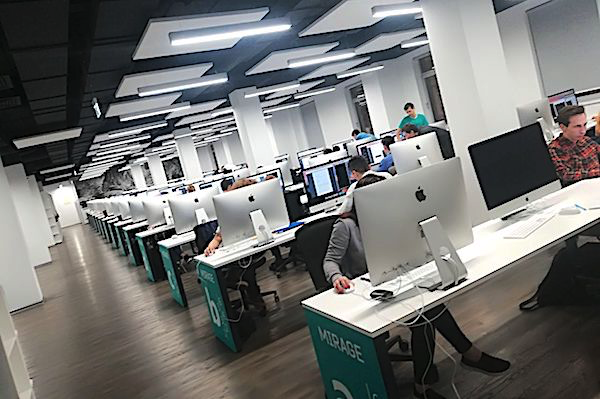
Nastya: During the "pool", by the way, the information was simpler. There were video lectures from French teachers who gave a lot of important things. Now there are no such materials. For each topic there is a video in one or two minutes, where the teacher describes the tasks and occasionally gives hints. For example, "you may be interested in the name algorithm." Or "here it is better to use static variables." Everything else is your own. Either you search on the Internet, or you communicate with the guys who made the projects.
Artem: Of course, this path may not lead you to exactly where you need it. But during some other project, the necessary algorithm from those that you have already seen somewhere may emerge in memory. This will immediately simplify the task.

- How is study organized?
Artem: We come in clusters whenever we want, sit down at any computer and start doing tasks. Our accounts are all on the intranet.
Nastya: In our "School" there are four working openspace clusters, there are about 500 computers on the floor. Now more, have already opened the third floor. Servers in Russia and in France, all the training data there. Once on the “pool” the system failed, everything unsaved was deleted, and this taught us not to delay push.
We have “glasses” - technical specialists who solve our problems with equipment and from time to time are engaged in trolling. If you forget to leave the account, there is a great risk that you will get the encodings knocked down, will be assigned slots for testing for a couple of days ahead, will come out of the channels in Slack. Or somehow instructively nakakostyat.
In total, we have three floors on campus. The first - locker rooms and reception. The second - the main, four classes with computers, kitchens, negotiations, a large atrium, and now also a game room with ping-pong. On the third floor there are also computers - they say that there will also be “pools”, exams.
Artyom: Our tasks are available from any device, but you can only launch it from an iMac connected to an intranet in class. You can do the whole project on your computer, and in “School 21” you can just pass it and check it. But in general, this is not worth doing, you miss the useful communication.
Nastya: Everyone has open statistics on completed projects. When you come to the class, you sit down and realize that your neighbor is already two projects ahead, it motivates. You start working with triple strength yourself. We have four clusters, and usually forty people in the same class are sitting next to you. Rush hour is usually after six in the evening when people are released from work. But you can meet someone at three in the morning.
With neighbors in the workplace, we organize in small groups of several people, constantly communicate. But nothing prevents you from going to another cluster and asking something. Or search in the general chat of those who made the project.
Projects are evaluated by peer-to-peer system. Only after the project is evaluated by several people will the program evaluate it. The rating system is not anonymous, so sooner or later you will meet each other. True, once I encountered a vindictive guy. At first I found a mistake in his project and lowered his estimate. Then he got my project and he was looking for a mistake in it for a long, very long time. Still found and lowered the score. However, I am not against it - neither four other verifiers, nor the checking program found this problem, and this was a mistake after all that one should be aware of. But the reaction of the person was still unusual - as a rule, no one takes offense at such things.
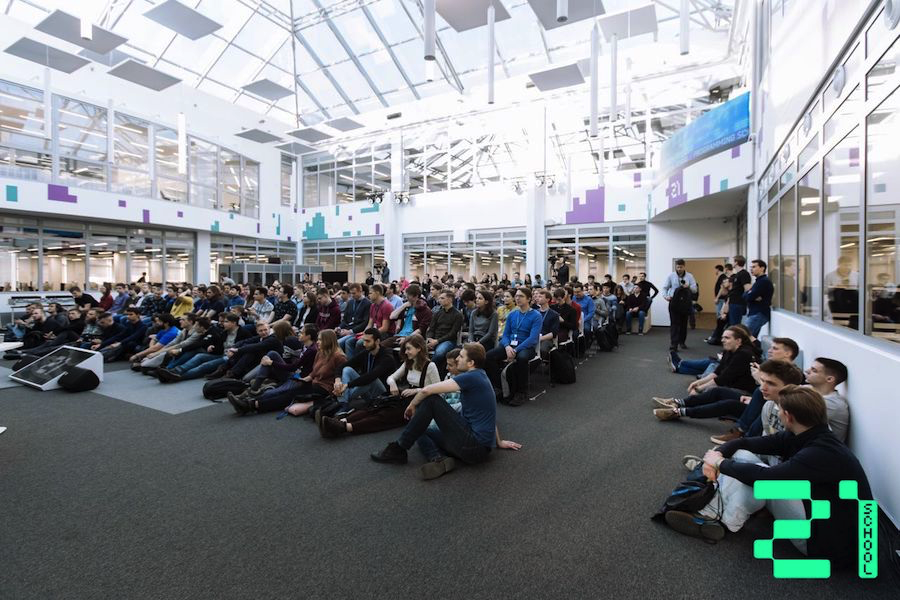
Maxim: Yes, we have famously organized gamification. In addition to projects there are achivki, everything is scored and easily visible. And add on time. We are recommended to allocate 40 hours a week for study, but there it will be as it will be. For the first year we need to score a certain number of points and thus pump up to level 7. Then every year there will be a new threshold for the minimum level, plus mandatory internships.
- Yes, let's talk about the future - internships, work. What are your plans? Invited to internship or maybe even to work?
Maxim: Not yet, we only study for a couple of months, we code only in C. According to the plan, we need to protect three common projects and only then we will choose one of the four development branches - unix, algorithms, graphics, web. Here, each branch will have its own projects, specialization will appear, but in three out of four branches you will still have to work on C. In such an emphasis on C, perhaps, the lack of "School of 21", since the employer will probably ask for more applied things. Now we write in C, monitor memory leaks and comprehend all the details of a low-level language.
Kirill: So far I have been trying to participate in interesting activities, for example, hackathons, I actively communicate with fellow students. We recently assembled a team of guys from the “School” and participated in ITHack, made a VR-toy on Unreal - the background knowledge helped. Received the prize - VR-helmet. I was also invited to an internship at SIBUR at the hackathon, even without a portfolio — I’ll think about it when I’ve completed my internship. In general, I heard that already eight companies came to our internship for our guys. But so far we have a low level, so no one was taken.
From February in “School 21” a new cycle of “pools” will begin, which will be held every month or two. Detailed information about the conditions and application form - on the website .

- Hey guys! How did you get into School 21? How did you decide on such a turn?
 Artyom: Before “School 21” I studied in the first year of a magistracy at a university in St. Petersburg and worked in the concern Aurora, which creates equipment for the military-industrial complex. He worked as an engineer, in accordance with his bachelor's degree - the direction “Management in technical systems”, the profile “Management of ship electric power systems and ship automation”. If not to go deep, then was engaged in equipment adjustment. I chose this specialty, because I had enough points on the exam. Romance is not enough. In general, I wanted to do programming from school.
Artyom: Before “School 21” I studied in the first year of a magistracy at a university in St. Petersburg and worked in the concern Aurora, which creates equipment for the military-industrial complex. He worked as an engineer, in accordance with his bachelor's degree - the direction “Management in technical systems”, the profile “Management of ship electric power systems and ship automation”. If not to go deep, then was engaged in equipment adjustment. I chose this specialty, because I had enough points on the exam. Romance is not enough. In general, I wanted to do programming from school.')
One summer, the news of “School 21” came from the chat of Sberbank. I ran through it, bookmarked it and forgot. In October, again I stumbled upon this school somewhere, began to dig deeper. He got carried away, passed the first tests, and after a few hours he was invited for a personal interview. He told the girl that we would need to go to Moscow - from the outside it certainly seemed like some kind of incomprehensible adventure. I traveled, underwent a personal interview, received a letter of enrollment in the "pool" (intensive programming course - 4 weeks, 10-14 hours a day, after which you can enroll in a long-term study) .
And here is the turning point. Or now you are changing life and doing in the future what you really like and inspire. Or you stay at the university on a specialty that is not very interesting, and you are doing this further in life. Decided to take a chance. The employer entered the position, let go without any problems and gave leave for the whole time of the “pool”. As for the university, I didn’t bother; I had closed everything up to the maximum and just left. I figured that if with “School 21” does not work, then in a couple of months I will have time to close everything that is left.
Passed the pool, returned to Peter. Was in the third wave of students. Monday was the deadline for the enrollment response. Experienced, even began to do laboratory work for the university. But when the letter of admission came, he closed everything and relaxed.
The next day I arrived at work in the morning and wrote a letter of resignation. It was a little sorry, the team there is very good. But this alone is not enough. Came to the "School", signed a contract. As a result, I had to abandon the university and work, leave from friends and girls.
 Kirill: I came from Stavropol, it is about 1500 km from Moscow. It all started with the fact that I didn’t pick up points on the EGE, and this brought down my plans for entering the HSE (Higher School of Economics). Summed up an essay on literature. He began to google "how to enter a university without a USE" and found "School 21".
Kirill: I came from Stavropol, it is about 1500 km from Moscow. It all started with the fact that I didn’t pick up points on the EGE, and this brought down my plans for entering the HSE (Higher School of Economics). Summed up an essay on literature. He began to google "how to enter a university without a USE" and found "School 21".What I read seemed convincing to me, but I also had to convince my parents. How to prove to them that it is better than high school? I told them a lot about the French School 42. They listened and listened and said: “Or maybe you will try after a year?” As a result, I did not immediately persuade my parents, stayed a month at home and did not get into the first stream of School 21. A month later, I was strongly encouraged by the feedback from the first thread, and I persuaded my parents after all. I went to the second wave.
At first, it was terribly hard at the “pool”, I didn’t understand what to do. I met with knowledgeable guys. We did the project a day or two, everything was fine, we all managed to pass. On the third day there was a deadline again, and I did not have time, as it became more difficult. On the fourth, everything happened again, deadlines began to pile up. Freaked out, even started to go home. But then I calmed down and realized that this was my only chance. In addition, after the traditional education, it still looked like a dream - you distribute time yourself, pump skills. Just like in MMORPG.
On three exams in the "pool" received very low points. But they gradually grew - first 15, then 17, then 22 points. With such varying success, I thought that after the "pool" I would have to return to Stavropol. But a month later, as a gift of fate, an invitation came!
Over time, by the way, we became interested in the criteria for admission to School 21. There are many assumptions on this topic, no one knows for sure. They say that there are only 15 criteria. They say that “School 21” is more interested in people without a special background, so that it would not be necessary to retrain people, but this is not accurate, so if you are going to enroll, you shouldn’t hide your real knowledge.
 Nastya: A year ago I graduated from the HSE, Faculty of Oriental Studies, specialization “Japan and Japanese”. After university, I went to work in a large Japanese company in Moscow.
Nastya: A year ago I graduated from the HSE, Faculty of Oriental Studies, specialization “Japan and Japanese”. After university, I went to work in a large Japanese company in Moscow.I worked there for almost a year. It was incredibly boring. Yes, you communicate with the Japanese, but you have to constantly delve into some kind of investment, logistics, and sales schemes. And in terms of supply of polymethyl methacrylates and pesticides. 20% of the time people actually do something, and 80% write what they did and why. I think this is a common problem for large companies in general and for Japanese ones separately, but something also depends on the industry. Waited for the end of the working day as a holiday, unbearable. It took me half a year, at this moment, despite the good wages and colleagues, I was determined to change something in my life.
I saw the announcement about “School 21” in “Vedomosti” - I needed to read her and other newspapers for work. For a long time it all soared at the level of a cool idea, like many other fateful things in my life. I decided to try. In general, for a long time I considered myself a purely humanist, I have a whole dynasty of humanities in my family. I liked mathematics and computer science at school, but it was taken for granted that I would go to some humanities department. I did not even think of taking the exam on computer science. But at the end of the university I began to wonder: why not try programming? After all, this is the type of work that I love, when there is a specific problem, and you are looking for the most effective solution. You do not sit behind the pieces of paper, do not convince people to buy exactly your product.
Although I did not have background programming knowledge, I was able to pass the first introductory tests without problems. The first was a keepsake, a repetition of combinations of lit squares. When it came to a combination of 64 squares, I had already failed the test. The second test was the selection algorithm * name *, which will bring the cursor from point A to point B. The test was divided into levels, it was necessary to complete a maximum of an hour, and I passed 12 levels. It seemed to me that I did not pass very well, but then I went through, came to a personal interview and got into the “pool”.
Now I am studying and I feel that I lack theoretical knowledge in matane, terver, combinatorics. Still, many guys already have such knowledge. Because of this, I need to work more than the rest in the pool, and on average I spent 14 hours all 14 days in classes. It was a good test for me, my relatives, my husband, who had not seen me all this time - I lived like a hermit.
The “pool” physically exhausted me, but until the last week I did not feel tired. The only thing I regretted is the lack of time. Do not have time to do one task, already give the following. If you do not understand the previous one, you need to catch up, combine. In general, it was difficult, but damn cool.
 Maxim: At school I studied computer science a little, took some related courses on Coursera, talked with friends on these topics. But I did not study closely. I received a humanitarian education as a civil servant, for three years I was still working as a model in Europe and Russia. After high school I went to the army. Interestingly, in the army, even though I had sports training and paperwork skills, basic programming skills turned out to be the most useful.
Maxim: At school I studied computer science a little, took some related courses on Coursera, talked with friends on these topics. But I did not study closely. I received a humanitarian education as a civil servant, for three years I was still working as a model in Europe and Russia. After high school I went to the army. Interestingly, in the army, even though I had sports training and paperwork skills, basic programming skills turned out to be the most useful.After the army, I wondered what to do next. The career of the model was no longer attractive - probably not the age, and indeed not my field. There was some experience with the civil service - I managed to understand that it was boring, uninteresting and useless. But programming was interesting - it is a creation, it is on the hype. Began to look for options, found a technical magistracy, several interesting courses. But this did not justify the expectations, did not feel the necessary returns.
At this point, a friend sent information about "School 21". Passed the first tests for memory, algorithms, then invited to a meeting and the "pool". Only there I understood what I signed up for, but it was great. I will not say that I donated something - I purposefully walked towards changing something in my life.
- The most vivid impressions of the "School"? What is the most difficult thing to learn?
Artem: I like the way the training is built here. Complete freedom of action, I can come and go when I want - in classical education this is not enough. I can practice from morning till night, at night. I can not appear for weeks, but it will affect the performance.
The most difficult thing in “School 21” is probably the search for information to complete tasks and projects. "School 21" gives only the direction in which to think and search. However, I think that this is more correct than offering the chewed material. For example, they give us a command in bash that lists the contents. And on assignment, you need to display this list sorted or somehow customized. To understand how to display a list with attributes, you have to dig yourself.

Nastya: During the "pool", by the way, the information was simpler. There were video lectures from French teachers who gave a lot of important things. Now there are no such materials. For each topic there is a video in one or two minutes, where the teacher describes the tasks and occasionally gives hints. For example, "you may be interested in the name algorithm." Or "here it is better to use static variables." Everything else is your own. Either you search on the Internet, or you communicate with the guys who made the projects.
Artem: Of course, this path may not lead you to exactly where you need it. But during some other project, the necessary algorithm from those that you have already seen somewhere may emerge in memory. This will immediately simplify the task.

- How is study organized?
Artem: We come in clusters whenever we want, sit down at any computer and start doing tasks. Our accounts are all on the intranet.
Nastya: In our "School" there are four working openspace clusters, there are about 500 computers on the floor. Now more, have already opened the third floor. Servers in Russia and in France, all the training data there. Once on the “pool” the system failed, everything unsaved was deleted, and this taught us not to delay push.
We have “glasses” - technical specialists who solve our problems with equipment and from time to time are engaged in trolling. If you forget to leave the account, there is a great risk that you will get the encodings knocked down, will be assigned slots for testing for a couple of days ahead, will come out of the channels in Slack. Or somehow instructively nakakostyat.
In total, we have three floors on campus. The first - locker rooms and reception. The second - the main, four classes with computers, kitchens, negotiations, a large atrium, and now also a game room with ping-pong. On the third floor there are also computers - they say that there will also be “pools”, exams.
Artyom: Our tasks are available from any device, but you can only launch it from an iMac connected to an intranet in class. You can do the whole project on your computer, and in “School 21” you can just pass it and check it. But in general, this is not worth doing, you miss the useful communication.
Nastya: Everyone has open statistics on completed projects. When you come to the class, you sit down and realize that your neighbor is already two projects ahead, it motivates. You start working with triple strength yourself. We have four clusters, and usually forty people in the same class are sitting next to you. Rush hour is usually after six in the evening when people are released from work. But you can meet someone at three in the morning.
With neighbors in the workplace, we organize in small groups of several people, constantly communicate. But nothing prevents you from going to another cluster and asking something. Or search in the general chat of those who made the project.
Projects are evaluated by peer-to-peer system. Only after the project is evaluated by several people will the program evaluate it. The rating system is not anonymous, so sooner or later you will meet each other. True, once I encountered a vindictive guy. At first I found a mistake in his project and lowered his estimate. Then he got my project and he was looking for a mistake in it for a long, very long time. Still found and lowered the score. However, I am not against it - neither four other verifiers, nor the checking program found this problem, and this was a mistake after all that one should be aware of. But the reaction of the person was still unusual - as a rule, no one takes offense at such things.

Maxim: Yes, we have famously organized gamification. In addition to projects there are achivki, everything is scored and easily visible. And add on time. We are recommended to allocate 40 hours a week for study, but there it will be as it will be. For the first year we need to score a certain number of points and thus pump up to level 7. Then every year there will be a new threshold for the minimum level, plus mandatory internships.
- Yes, let's talk about the future - internships, work. What are your plans? Invited to internship or maybe even to work?
Maxim: Not yet, we only study for a couple of months, we code only in C. According to the plan, we need to protect three common projects and only then we will choose one of the four development branches - unix, algorithms, graphics, web. Here, each branch will have its own projects, specialization will appear, but in three out of four branches you will still have to work on C. In such an emphasis on C, perhaps, the lack of "School of 21", since the employer will probably ask for more applied things. Now we write in C, monitor memory leaks and comprehend all the details of a low-level language.
Kirill: So far I have been trying to participate in interesting activities, for example, hackathons, I actively communicate with fellow students. We recently assembled a team of guys from the “School” and participated in ITHack, made a VR-toy on Unreal - the background knowledge helped. Received the prize - VR-helmet. I was also invited to an internship at SIBUR at the hackathon, even without a portfolio — I’ll think about it when I’ve completed my internship. In general, I heard that already eight companies came to our internship for our guys. But so far we have a low level, so no one was taken.
From February in “School 21” a new cycle of “pools” will begin, which will be held every month or two. Detailed information about the conditions and application form - on the website .
Source: https://habr.com/ru/post/434296/
All Articles